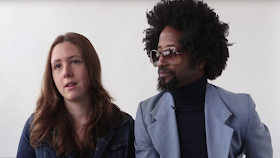Yes it's couple-centric, but that's because most of society is. A month ago The Atlantic put up a nice 6-minute film of people talking about their open and poly relationships. It's part of a collection of independently produced videos that the magazine curates. It seems to have grown legs, with 66,000 views so far. Several people have forwarded it to me.
From the text with it, Couples Speak Honestly About Open Relationships (March 30, 2018):
Polyamory. Ethical non-monogamy. Open relationship. There are many ways to describe the consensual choice a couple can make to live a non-monogamous lifestyle — and ever more ways to navigate it. Maria Rosa Badia’s new short film Polyedric Love [an obsolete spelling of polyhedric, many-sided] features honest conversations with couples about the rewards and challenges of their unconventional relationships.
“We’ve always been told that there’s this one way of being with someone, and if you retract from it, it’s not right societally,” says a woman in the film. “But if it’s right instinctually…”
Making the film was an eye-opening experience for Badia, who came to see non-monogamous relationships as an inspiration. ...
Amy Gahran, author of Stepping Off the Relationship Escalator, posted her evaluation:
Pros:
- Racially diverse
- Accessible to a mainstream audience
- Nicely produced
- Defines unfamiliar terms in a graceful way
- Addresses some negatives along with positives: supports believability.
Cons:
- Opposite-sex couples only.
- No age diversity; all subjects appear to be in late 20s-early 30s
- Completely couple-centric; reinforces the stereotype that polyamory = couple+
- Only pre-existing couples that had "opened up" are included. Other partners not included.
- No solo poly representation.
- Mentions hierarchical polyamory, but no egalitarian models.
Also, to the cons I'd add the irrelevant clickbait cover illustration that someone at The Atlantic stuck onto it: a matchstick demonstration of sex positions. This is a cynical treatment for heartfelt interviews about loved ones that contain barely a mention of sex. More evidence that that's the only thing some people can think of when seeing a nontraditional relationship.
I find this trivialization especially insulting because Badia dedicated the film to the life and memory of Yuanyuan Wang-Fiengold, who briefly appears in it.
[Permalink]


No comments:
Post a Comment